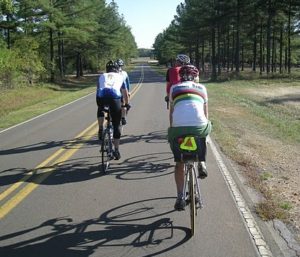House Transportation Committee Chairs John Torbett, Frank Iler, and Phillip Shepard and HB232 bill sponsor Representative Jeter are working to improve bicyclist safety and reduce conflicts between motorists and bicyclists by proposing the adoption of many of the valuable recommendations from the HB232 Bicycle Safety Law Study conducted this past fall. We believe that implementation of House Bill 959: DOT Proposed Legislative Changes will add to the safety of all bicyclists and motorists on public roadways.
Readers can view the entire proposed committee substitute here, but a few of the main points include:
- Legalizing the commonly-used right-hand turn signal for right turns
- Extending the motorists’ legal protection as vulnerable road users to bicyclists
- Requirements for lights or reflective gear on bicyclists at night (we recommend more specific requirements)
- Allowing vehicles to pass slower-moving bicycles and mopeds
- Requiring the DOT to provide educational programs for bicyclists and motorists
- Revising the definitions of autocycles, mopeds, and electric assisted bicycles
BikeWalk is especially excited about the directive to educate motorists and bicyclists about the best practices on the roads. We think that if motorists are educated about best practices when encountering bicyclists, such as changing lanes to pass, and bicyclists follow the laws and best practices, conflicts will decrease. BWNC hopes to be able to work with the DOT and many of you on this education program moving forward, as we believe a grassroots approach will be more effective and less costly. Either way, more funding, is needed to implement this education program.
The bill also adds a definition for electric assisted bicycles, or “e-bikes.” BikeWalk NC worked with the NCDOT (DMV) to add this specific language, because otherwise, e-bikes would be classified as motorcycles, unable to meet those requirements, and thus not be allowed on our roads. BikeWalk NC would like to thank the NCDOT and DMV for working with us to recommend modifications to the legislature and to People for Bikes for helping us understand the emerging technologies, federal exemptions in place, and how other states are addressing e-bikes.
The desired language for defining e-bikes and other bike safety law provisions were added to HB959 through a Proposed Committee Substitute (PCS) that was discussed by Senate Transportation Committee members on May 24. Revised House Bill 959 was introduced on the House floor today and could be heard as soon as tomorrow (May 26) . Please let us know if you have concerns/comments about these changes or let the legislators know directly.
The NCDOT HB232 report deviated in a couple areas from the recommendations of the state-wide expert panel that they established. BWNC opposes the areas where NCDOT deviated (i.e. requiring permits for group rides and requiring cyclists to ride to the right of center on some roads). Fortunately, the House Transportation Chairs did not include these items where there is not agreement. However, the Chairs have repeatedly stated that they plan to revisit and propose more changes in the long session (Spring/Summer 2017). In the meantime, we all need to work on communicating the benefits of being able to easily and safely walk and bike in North Carolina to our state’s leadership. Find your legislator here and let them know why cycling is important to you and our state.

Ned Kennington says
I worry that the language “or the operator must wear clothing or a vest that is bright and visible from a distance of at least 300 feet to the rear of the bicycle” might be read to imply that the clothing or vest must be visible from 300 feet even in the absence of illumination from adequate headlights. (However “adequate headlights” is defined.)
.
Lisa Riegel says
Ned
BWNC supports the concept of requiring more visibility at night to improve safety and is glad to see the legislature moving in that directions. BWNC recommends the requirement for a rear light and not just reflective clothing. If the language is fixed about the reflective clothing to address clarity like you’ve suggested, BWNC recommends specifying ANSI Class 2 reflective vest. However, the legislature is moving fast and doesn’t want to tweak too much or do anything controversial this short session so we plan to work with the legislature next session to improve this language, pushing more for requiring a rear lighted lamp rather than the option of reflective clothing. The public can always comment on the language by emailing the bill sponsors.